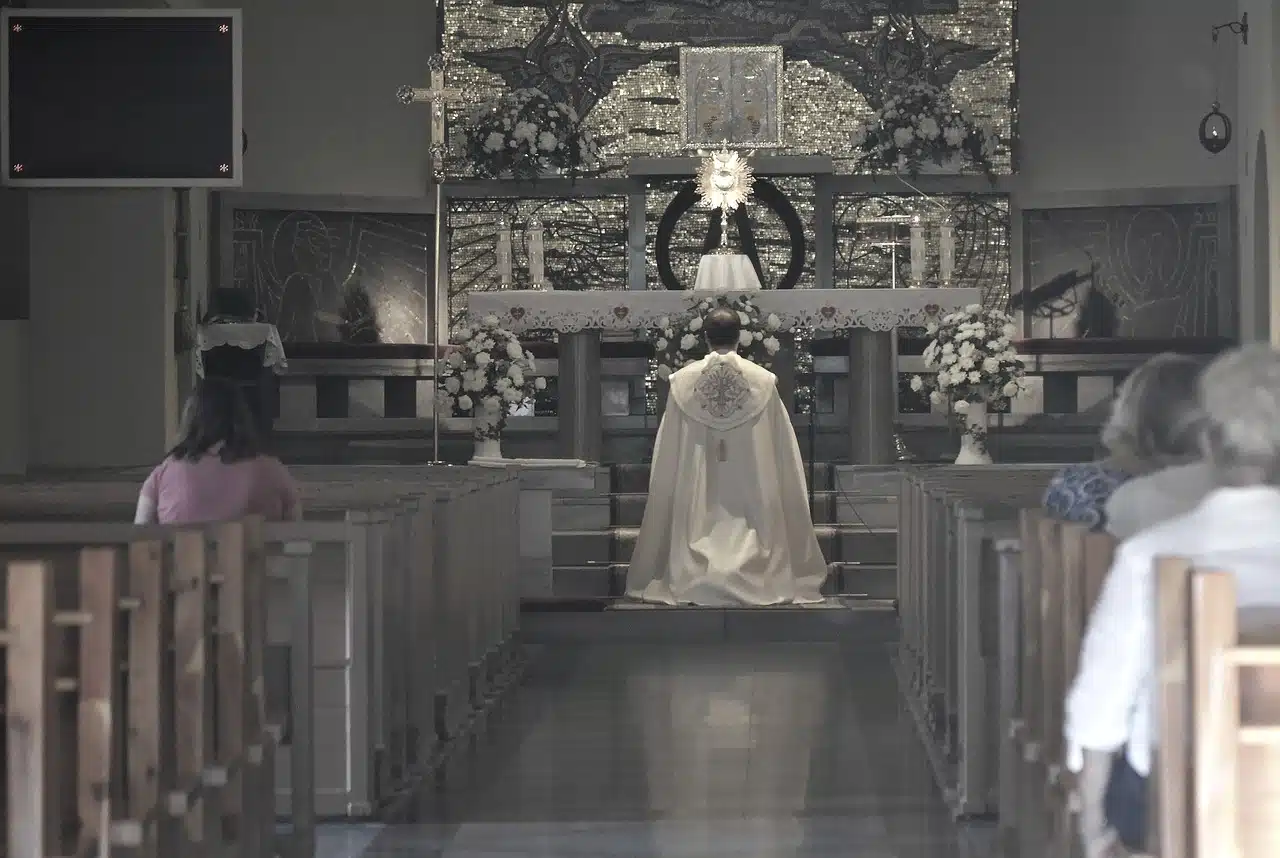Why Our World Needs the Good News of Marriage

A few days ago, Archbishop Gabriele Giordano Caccia, Permanent Observer to the Mission of the Holy See to the United Nations, expressed his concern that “the family is increasingly downplayed or even denigrated in international fora.”
Archbishop Caccia was addressing the 62nd Session of the Commission for Social Development at the United Nations in New York. He noted that even the UN’s Universal Declaration of Human Rights recognizes that the “family is the natural and fundamental group unit of society and is entitled to protection by society and the State.”
As such, he noted, it is “central to social development,” and not something that is “ancillary” or even “harmful,” as many people in modern times have suggested. The archbishop quoted Pope Francis who noted in Fratelli tutti that the family is “the first place where the values of love and fraternity, togetherness and sharing, concern and care for others are lived out and handed on” (no. 114).
The archbishop added:
For many around the world, the family is not only the first but also the only form of social protection, a community of reciprocity and care. Parents are the primary educators of their children. Families are often the strongest advocates for their members who might otherwise be ignored or considered a burden by society. Each member of a family gives and receives irreplaceable love, care, and support. For this reason, social policies must support the family in its essential role in achieving social justice and social development.
Marriage Betters All Aspects of Society
As Catholics, we know that the family has a very noble mission. Such has been the constant teaching of the Church from its earliest days. This mission can be looked at from two angles—i.e., the broadly human, or the specifically Christian. Looked at either way, however, the family emerges as carrying a level of importance, influence, and dignity that cannot be overstated.
As Pope Francis once put it, “The welfare of the family is decisive for the future of the world and that of the Church” (Amoris laetitia, no. 31). For this reason, he added, as “Christians, we can hardly stop advocating marriage simply to avoid countering contemporary sensibilities, or out of a desire to be fashionable or a sense of helplessness in the face of human and moral failings” (Amoris laetitia, no. 35).
Or, as Pope St. John Paul II wrote in his Letter to Families in 1994, “The family has always been considered as the first and basic expression of man’s social nature.” He went on to note that society and governments have every inducement to protect marriage and the family, as being in their own self-interest. As he wrote,
The “sovereignty” of the family is essential for the good of society. A truly sovereign and spiritually vigorous nation is always made up of strong families who are aware of their vocation and mission in history. The family is at the heart of all these problems and tasks. To relegate it to a subordinate or secondary role, excluding it from its rightful position in society, would be to inflict grave harm on the authentic growth of society as a whole.
In other words, even apart from any specifically spiritual considerations, there are innumerable good reasons for governments and societies to focus their energies on encouraging healthy marriages and strong families.
Family Life is Essential to the Church’s Mission
However, if one takes into account the Scriptural teachings of the role of the family, from Genesis through to Christ’s uncompromising defense of and St. Paul’s mystical theology of marriage, one sees that the family is not only the pillar of a strong and healthy society, but it is also the training ground of souls, and therefore carries eternal significance, as being essential to the Church’s salvific mission.
This is encapsulated in the notion of the family as the “domestic church,” language that is traceable back to the earliest days of the Church. Speaking of this, Pope St. John Paul II explains in Gratissimam sane: “The family itself is the great mystery of God. As the ‘domestic church’, it is the bride of Christ. The universal Church, and every particular Church in her, is most immediately revealed as the bride of Christ in the ‘domestic church’ and in its experience of love: conjugal love, paternal and maternal love, fraternal love, the love of a community of persons and of generations” (no. 19).
Elsewhere in Gratissimam sane, Pope St. John Paul II includes this remarkable statement of the spiritual importance of the family, writing, “[T]he family is placed at the center of the great struggle between good and evil, between life and death, between love and all that is opposed to love. To the family is entrusted the task of striving, first and foremost, to unleash the forces of good, the source of which is found in Christ the Redeemer of man” (no. 23).
What an astonishingly powerful defense of the family!
Marriage Increases Personal Satisfaction
One of the great satisfactions of defending the Church’s teachings on marriage and family, is keeping abreast of the many ways in which those teachings have been vindicated by contemporary sociology and psychology.
As I have often noted in the past, there is an enormous amount of research that shows that strong marriages and strong families produce a litany of unquestioned social goods. This includes everything from significant reductions in things like poverty, crime, mental illness, and welfare spending, to significant increases in things like children’s academic performance, social mobility, and career success.
However, something I find especially interesting, is how well marriage and family life perform even in the narrow terms of the priorities of contemporary society.
Let me explain.
There are good reasons to believe that contemporary American society is the most individualistic society in history. One consequence of this that we rarely evaluate things in terms of the “common good,” preferring instead to focus on hyper-individualistic values such as “self-fulfillment,” “self-actualization,” or “happiness,” understood in superficial terms as positive feelings.
The bitter irony of this contemporary focus on individualistic self-actualization over the common good, however, is how reliably it produces anything but happiness.
Two weeks ago, for instance, I mentioned an article published in the New York Times about a married mom of two who was living the “polyamorous” lifestyle—i.e., pursuing sexual relationships with other men, with the consent of her husband. While the woman protested that she pursued these relationships in order to find “self-actualization,” what came through most clearly in the article was her deep unhappiness, restlessness, and misery.
Compare the confusion and chaos of her unsettled and at times grotesquely unseemly life, to the serenity of a long-married couple that has consciously and carefully cultivated a deep and abiding love, rooted in fidelity and mutual self-gift. Yes, the members of such a couple must often have chosen to deny themselves one or another desire, placing their own desires on the altar of the mutual good of their marriage. And yet, the fruit of this is not bitterness or unhappiness, but rather a kind of serenity and satisfaction that is far more deep and abiding than anything that the sexual revolution has produced.
In other words, not only is such a marriage good for society, and good for the couple’s children…but it is also unquestionably far more satisfying for them.
A Good Marriage Improves Overall Happiness
Recently, the social researcher, Brad Wilcox, published a book entitled “Get Married: Why Americans Must Defy the Elites, Forge Strong Families, and Save Civilization.” The title neatly encapsulates the overall message of the book.
However, as Wilcox notes, while there are many good social reasons to support marriage, it is also the case that all the research clearly affirms that marriage is enormously powerful as a producer of happiness and self-fulfillment.
As he writes in the book, “Marital quality is, far and away, the top predictor I have run across of life satisfaction in America. Specifically, the odds that men and women say they are ‘very happy’ with their lives are a staggering 545 percent higher for those who are very happily married, compared with peers who are not married or who are less than very happy in their marriages.”
“When it comes to predicting overall happiness, a good marriage is far more important than how much education you get, how much money you make, how often you have sex, and, yes, even how satisfied you are with your work.”
Perhaps one of the most telling ironies of all, is that the personal satisfaction produced by marriage extends to the one area that our society worships above all else, i.e. sex.
The conventional “wisdom” of our age is that sexual satisfaction is one of the most important things in life, and that the best way of achieving it to chase sexual novelty with many different partners. And if one ever does settle down with one partner, one of the most important things to look for is “sexual compatibility,” which can only be known if one has had sexual relationships with many people.
However, as Wilcox notes, all the research points out that, on average, married couples not only report more satisfying sex, but also tend to have sex more often than their unmarried counterparts. And so, while the prophets of sexual “liberation” preach promiscuity, infidelity, polyamory, and fornication as the paths to self-fulfillment, and marriage as inherently oppressive and out-of-date, it is those who are married who are far more likely to actually achieve even the aims that sexual “liberation” promises…and fails to deliver.
The Church’s Quiet Wisdom Touches Our Deepest Desires
One of the themes that I often emphasize in these columns is the quiet, stable, often-hidden wisdom of the Church’s teachings.
The history of secular society over the past two centuries is a tale full of sound and fury. The world has witnessed an ever-revolving series of novel ideologies, all proclaiming to be “the answer” to humanity’s ills, e.g. revolutionary socialism, eugenics, fascism, communism, scientism, the sexual revolution, and transhumanism.
In the midst of this maelstrom of trendy ideas and messianic promises, the Church has quietly preached the same messages, over and over again. As civil society has been roiled by rapid and often-violent change, the Church has refused to change. For this, She has continually been attacked and accused of standing in the way of “progress.” Even some within the Church have fretted and worried that the Church is being left behind, and ought to change to “get with the times.”
And yet, what we have seen over and over again, is that the wisdom of the Church’s teachings, which is informed by the collective wisdom of many millennia of experience, and inspired by the still, quiet voice of the Holy Spirit, penetrates far deeper than the superficial and flashy trends of the day, pointing to the true nature of reality and human beings.
Our modern prophets of sexual liberation have proclaimed marriage dead and unnecessary, an institution that has outlived its usefulness, to be replaced by a newer, freer model of sexual freedom that would produce a shiny new era of personal and sexual satisfaction.
Against this, the Church has stood firm, proclaiming that, “Marriage and the family are institutions that must be promoted and defended from every possible misrepresentation of their true nature, since whatever is injurious to them is injurious to society itself” (Sacramentum caritatis, no. 29).
We should marvel and be thankful for this rock-like wisdom, which, contrary to the complaints of the modernists, is not “oppressive” or “backward.” It is, rather the key that unlocks the hidden truths of human nature, creating the conditions for the flourishing of human beings, and the satisfaction of their deepest desires. We should not be surprised then, when unbiased scientific research continually affirms the wisdom of the Church’s teachings, and that the Church refuses to “get with the times.”








Spot on! Get married, get satisfaction is the rule Mick Jagger (and his cult followers) should have learned.
Interestingly, Mick Jagger also sang, “you can’t always get what you want – but if you try sometime, you just might find, that you get what you need!” And certainly, what our society needs now is more strong marriages. More and more people, thank God, seem to be realizing that the “liberated” lifestyle is leaving them sad and empty – let’s hope they find their way to true happiness.